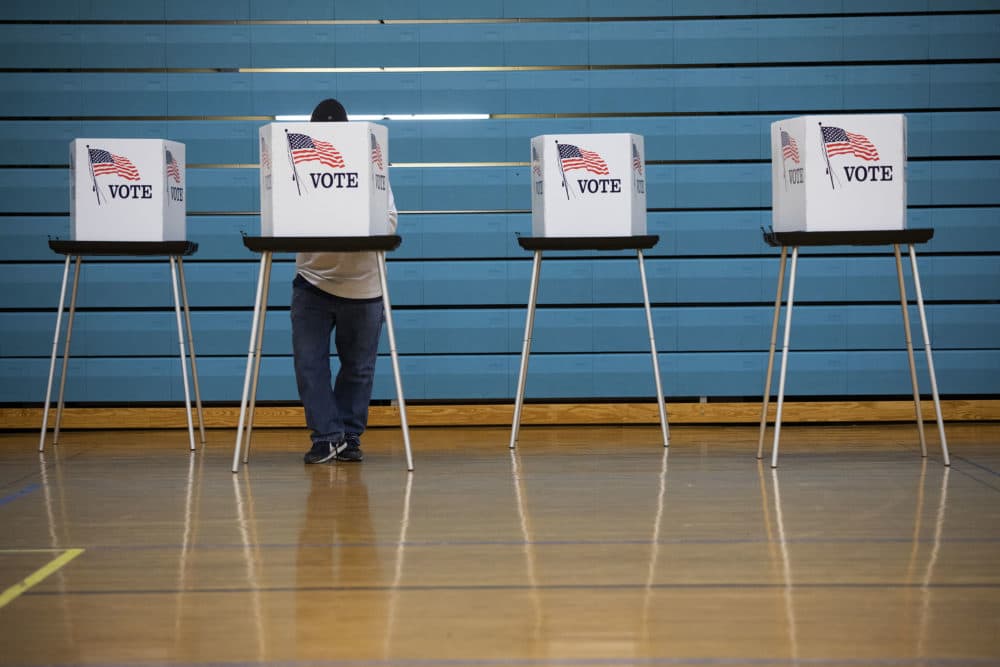Advertisement
Split-ticket voters and their impact on the latest election
Resume
Sign up for the On Point newsletter here.
In a country that’s increasingly polarized, many voters in the midterms used their ballot to say it doesn’t have to be that way.
"Split-ticket voters,” people who vote Democrat in one race and Republican in another, showed up in key states like New Hampshire, Ohio and Georgia.
Today, On Point: What the recent wave of ticket splitting tells us about what American voters are looking for.
Guests
Tim Miller, The Bulwark's writer-at-large. Author of Why We Did It: A Travelogue from the Republican Road to Hell. (@Timodc)
Gary Jacobson, political science professor at the University of California San Diego. Author of The Electoral Origins of Divided Government and co-author of Strategy and Choice in Congressional Elections.
Neil Levesque, executive director at the New Hampshire Institute of Politics at Saint Anselm College. (@NeilLevesque)
Interview Highlights
On Trump's presidential bid
Tim Miller: "I thought it was a weird announcement last night, to put it in the most succinct manner possible. Generally, there's a lot of buildup and excitement for an announcement. Donald Trump didn't even seem particularly excited to be there. It seems like this announcement was based mostly on his petty grievances and wanting to get back at people that he feels had wronged him. The timing was very strange. Kari Lake had just lost the day before. The candidate that ran most in his image, and a lot of candidates ran on his image.
"But I think the purest essence of Trumpism ran in a swing state of Arizona. They just announced her defeat the night before. So he certainly wasn't announcing from a position of strength. You know, the venue was also strange. But that's typical of Trump, I guess. His first announcement venue was strange. So I don't think we're in a ... count him out, count your chickens before they've hatched kind of phase, like we're done with Trump. But he does seem about as weak politically within the Republican Party as he's been maybe since he came down the escalator. Or maybe, probably, I guess since the Access Hollywood tape."
Why did we see so many split ticket voters in this election?
Tim Miller: "There was a group in the center of the electorate that determined that they felt very uncomfortable with two particular issues, the abortion extremism that you saw from certain Republican candidates, and the election denialism and anti-democracy extremism. There were other things wrapped up in that. You know, some of the kind of weird positioning and campaigning that some of these candidates made on gender and identity issues. ... So just generally, I think that there was a sense that candidates were too extreme.
"And so you saw voters splitting who they would go with. A lot of these were people like my folks, that people that had been Republicans who had left the party over Trump. You know, Virginia is a great example of this. I think a lot of people were worried in the Democratic Party that the Glenn Youngkin election was a sign that the working-class Obama Trump voters had permanently went to the Republican Party. But the more college educated suburban, you know, Mitt Romney, Biden voters, you know, the never Trumper types, were going back to their own, to their old party. Those two groups, you know, ended up really looking at these candidates now and on a candidate-by-candidate basis.
"And so you saw a lot of people that voted for Joe Biden in 2020, voted for Glenn Youngkin in 2021, and then maybe voted for Abigail Spanberger, for example, as a suburban moderate Democrat in the kind of area between Richmond and Washington, D.C. And so, you know, these voters ... now mark the new swing voters, and they were happy to split their tickets."
On the history of split ticket voters
Gary Jacobson: "Over the long history, if you go back to the 19th century, we had very high levels of party line voting. That changed over the course of the 20th century. And then from sort of the 1960s through maybe the early 1990s, ticket splitting was quite common in federal elections. It became less so in this century to the point where it was extremely uncommon in, say, 2020, where straight ticket voting was on the order of 95% of the voters.
"In this election, there seems to have been more ticket splitting. But it's not clear that it was a lot of ticket splitting at the federal level. We don't know yet whether people who voted for Republican for the Senate voted Republican for the House, and Democrats the same way. So that remains. We have to get the data before we can say that. But clearly, there was ticket splitting between senator and governor, and governor in the House in a number of these states."
You're up there in New Hampshire, a mere 14 months before the New Hampshire primary. What are you focused on now?
Tim Miller: "The intra party fight with the Republicans over the next few months is going to be very interesting. Obviously, the knives are out. My sense is that they are not going to learn the right lessons. I think that you're going to see a lot of folks from the more MAGA Freedom Caucus wing, in the House pushing Kevin McCarthy to do more investigations, be more aggressive on the border, really, you know, kind of follow in Trump's footsteps in a lot of ways.
"And I think there are going to be other Republicans who, you know, are finally getting off the sidelines. You know, I saw an article from the National Review today saying unmistakably no for Trump. So I think that there was this division within the Republican Party that was underneath the surface because people were too afraid to speak out against Trump, or else they would be cast out. And I think that is going to come above the surface in the next few months. And it will be interesting to see how that plays out."
Related Reading
The Bulwark: "Democracy was on the ballot. And attempts to end it were met with universal scorn." — "Y’all. They all lost. Every single fucking one. Now that Kari Lake’s soft focus has faded into oblivion, the election denier sweep is complete."
This program aired on November 16, 2022.

